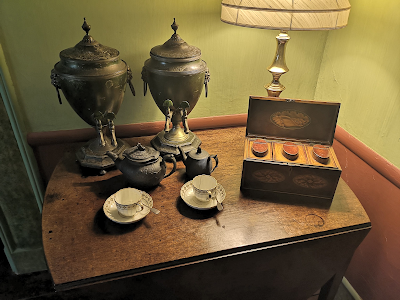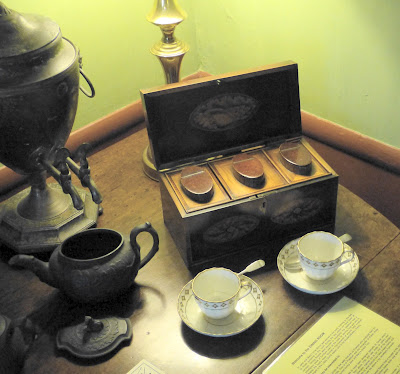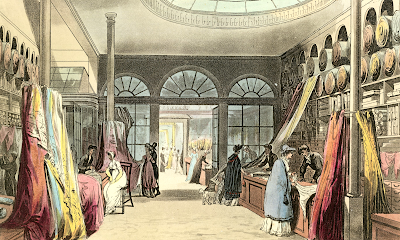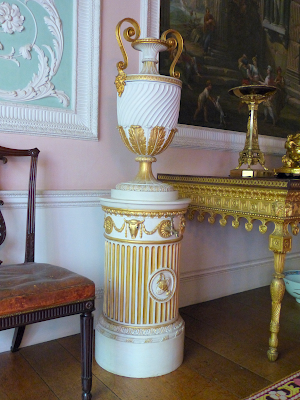 |
| Urns and tea caddy in the dining room, A la Ronde (2015) |
Now, I don’t know about you, but breakfast was a do-it-yourself meal in my family home when I was growing up. It was not a social meal, and we would eat at different times, still dressed in our pyjamas, soon after waking up.
Breakfast in the Regency was quite different.
 |
| Print by T Rowlandson (1802-11) after H W Bunbury |
A Regency breakfast was normally a social occasion when all the family gathered at a specific time to eat together. The timing varied from household to household, but 9 am, 9.30 am and 10 am were common times.
François de la Rochefoucauld wrote in 1784:
The commonest breakfast is at 9 o’clock and by that time the ladies are fully dressed with their hair properly done for the day.2In Pride and Prejudice, Lydia declares:
“Well, and so we breakfasted at ten as usual; I thought it would never be over.”3Jane Austen wrote to her sister in 1808:
It has struck ten; I must go to breakfast.4
This variety is emphasised in a paragraph in Persuasion which states:
The morning hours of the Cottage were always later than those of the other house, and on the morrow the difference was so great that Mary and Anne were not more than beginning breakfast when Charles came in to say that they were just setting off.5
 |
| Tea things in the dining room, A la Ronde (2015) |
This excerpt from Fanny Burney’s Camilla suggests that it was normal practice to wait for everyone to arrive before starting. Sir Hugh is impatient for his breakfast the morning after a ball:
The next morning, not considering that every one else would require unusual repose, he [Sir Hugh] got up before his customary hour, from an involuntary hope of accelerating his favourite project; but he had long the breakfast parlour to himself, and became so fatigued and discomfited by fasting and waiting, that when Indiana, who appeared last, but for whom he insisted upon staying, entered the room, he said: “My dear, I could really find a pleasure in giving you a little scold, if it were not for setting a bad example, which God forbid! And, indeed, it's not so much your fault as the ball's, to which I can never be a sincere friend, unless it be just to answer some particular purpose.”
Miss Margland defended her pupil, and called upon Mandlebert for assistance, which he readily gave. Sir Hugh then was not merely appeased but gratified, and declared, the next moment, with a marked smile at Indiana, that his breakfast [he] had not relished so well for a twelvemonth, owing to the advantage of not beginning till he had got an appetite.6
 |
| Mrs Bennet in Pride and Prejudice (1895 edition) by CE Brock |
Mr Allen attended her to Milsom Street, where she was to breakfast, and saw her seated with the kindest welcome among her new friends; but so great was her agitation in finding herself as one of the family, and so fearful was she of not doing exactly what was right, and of not being able to preserve their good opinion, that, in the embarrassment of the first five minutes, she could almost have wished to return with him to Pulteney Street.In Sense and Sensibility, an outing was planned, and they all met at Barton Park for breakfast before setting out:
Miss Tilney’s manners and Henry’s smile soon did away some of her unpleasant feelings; but still she was far from being at ease; nor could the incessant attentions of the general himself entirely reassure her. Nay, perverse as it seemed, she doubted whether she might not have felt less, had she been less attended to. His anxiety for her comfort—his continual solicitations that she would eat, and his often-expressed fears of her seeing nothing to her taste—though never in her life before had she beheld half such variety on a breakfast-table—made it impossible for her to forget for a moment that she was a visitor. She felt utterly unworthy of such respect, and knew not how to reply to it. Her tranquillity was not improved by the general’s impatience for the appearance of his eldest son, nor by the displeasure he expressed at his laziness when Captain Tilney at last came down. She was quite pained by the severity of his father’s reproof, which seemed disproportionate to the offence; and much was her concern increased when she found herself the principal cause of the lecture, and that his tardiness was chiefly resented from being disrespectful to her.7
By ten o’clock the whole party was assembled at the park, where they were to breakfast. The morning was rather favourable, though it had rained all night, as the clouds were then dispersing across the sky, and the sun frequently appeared. They were all in high spirits and good humour, eager to be happy, and determined to submit to the greatest inconveniences and hardships rather than be otherwise.Where was it eaten?
While they were at breakfast the letters were brought in. Among the rest there was one for Colonel Brandon;—he took it, looked at the direction, changed colour, and immediately left the room.
“What is the matter with Brandon?” said Sir John.
Nobody could tell.
“I hope he has had no bad news,” said Lady Middleton. “It must be something extraordinary that could make Colonel Brandon leave my breakfast table so suddenly.”8
 |
| The breakfast room, Kenwood House (2019) |
He [Edward Ferrars] joined her [Elinor] and Marianne in the breakfast-room the next morning before the others were down.9The Reverend Thomas Talbot, staying with his sister at Saltram House in the early 1800s wrote that if there were no visitors, breakfast was eaten in the Blue Bow Room, but if there were visitors, breakfast was eaten in the morning room at 10.30 am.10
Although breakfast was generally a social meal, not everyone joined the breakfast table.
In Camilla, Mrs Arlbery did not join the others for breakfast:
Camilla could not refrain from an eager affirmative; and the conversation was then interrupted by a message from Mrs Arlbery, who always breakfasted in her own room, to announce that she was going out lodging-hunting.11In Maria Edgeworth’s Belinda, Lady Delacour breakfasted in her dressing-room, but not always alone:
“Yes—no—stay—Lord Delacour is at home. I will get up immediately. Let my lord be told that I wish to speak with him—that I beg he will breakfast with me in my dressing-room half an hour hence. I will dress immediately.”12Before breakfast
Breakfast was the first meal of the day, but not the first activity. Generally, people were up for a couple of hours before they gathered for breakfast.
On waking, a lady might drink a cup of hot chocolate in her room to sustain her until breakfast time. During the first hour or two of her morning, she might write letters, go for a walk, or even go shopping.
 |
| Illustration by H Thompson from Persuasion (1897 edition) |
“A walk before breakfast does me good.”13Similarly, in Jane Austen’s Persuasion during the trip to Lyme:
Anne and Henrietta, finding themselves the earliest of the party the next morning, agreed to stroll down to the sea before breakfast.14In a letter to her sister dated 15 September 1813, Jane Austen wrote:
We did go to Layton and Shear's before breakfast. Very pretty English poplins at 4s. 3d.; Irish, ditto at 6s.; more pretty, certainly,—beautiful.15In Sense and Sensibility, Edward Ferrars avoids being alone with Elinor in the breakfast parlour:
“I am going into the village to see my horses,” said he, “as you are not yet ready for breakfast; I shall be back again presently.”16The Dukeof Wellington had a habit of waking early and dealing with his correspondence before breakfast.
 |
| Harding Howell & Co, Ackermann's Repository (1809) |
The main constituent of breakfast was bread or toast and butter, with tea and coffee to drink. This could be served with marmalade and other preserves.
François de la Rochefoucauld wrote in 1784:
Breakfast consists of tea and bread and butter in various forms. In the houses of the rich, you have coffee, chocolate and so on. The morning newspapers [are] on the table and those who want to do so, read them during breakfast.17As a foreign traveller in England, Don Manuel Alvare Espriella described breakfast:
The English do not eat beef-steaks for breakfast, as lying travellers have told us, nor can I find that it has ever been the custom. The breakfast-table is a cheerful sight in this country: porcelain of their own manufactory, which excels the Chinese in elegance of form and ornament, is ranged on a Japan waiter, also of the country fabric; for here they imitate every thing. The mistress sits at the head of the board, and opposite to her the boiling water smokes and sings in an urn of Etruscan shape. The coffee is contained in a smaller vase of the same shape, or in a larger kind of tea-pot, wherein the grain-is suspended in a bag; but nothing is so detestable as an Englishman's coffee. The washing of our after-dinner cups would make a mixture as good; the infusion is just strong enough to make the water brown and bitter. This is not occasioned by economy, though coffee is enormously dear, for the people are extravagant in the expences of the table: they know no better; and if you tell them how it ought to be made, they reply, that it must be very disagreeable, and even that if they could drink it so strong, it would prevent them from sleeping. There is besides an act of parliament to prevent the English from drinking good coffee: they are not permitted to roast it them selves, and of course all the fresh and finer flavour evaporates in the warehouse. They make amends however by the excellence of their tea, which is still very cheap, though the ministry, in violation of an explicit bargain, increased the tax upon it four fold, during the last war. This is made in a vessel of silver, or of a fine black porcelain: they do not use boiled milk with it, but cream in its fresh state, which renders it a very delightful beverage. They eat their bitter bread in various ways, either in thin slices, or toasted, or in small hot loaves, always with butter, which is the best thing in the country.18
 |
| Tea caddy, A la Ronde (2015) |
Those that could afford it took their tea with hot milk or cream, and nearly always with sugar – at least until the abolitionist movement encouraged people to boycott sugar which came from plantations using slave labour.
The fare on offer was not always restricted to bread or toast and butter. In Mansfield Park, it appears that breakfast included eggs and cold pork:
After seeing William to the last moment, Fanny walked back to the breakfast-room with a very saddened heart to grieve over the melancholy change; and there her uncle kindly left her to cry in peace, conceiving, perhaps, that the deserted chair of each young man might exercise her tender enthusiasm, and that the remaining cold pork bones and mustard in William's plate might but divide her feelings with the broken egg-shells in Mr Crawford's.19
 |
| Urn in eating room at Osterley Park (2015) |
Sometimes, a breakfast was held as an event, like a party. The Persian ambassador, MirzaAbul Hassan, wrote of attending a breakfast masquerade at the home of Lady Buckinghamshire in May 1810. Around 500 people were invited, most of whom came in fancy dress, and tables full of food and drink were laid out in the garden.20
Public breakfasts
Breakfasts could also be held publicly.
In Camilla, they attend a public breakfast:
“Come, my little girls, come!” cried he, as he entered the room; “get your hats and cloaks as fast as possible; there is a public breakfast at Northwick, and you are all expected without delay.”Jane Austen wrote to her sister Cassandra on 17 May 1799:
This sudden invitation occasioned a general commotion. Indiana gave an involuntary jump; Camilla and Eugenia looked delighted; and Miss Margland seemed ready to second the proposition; but Sir Hugh, with some surprise, exclaimed: “A public breakfast, my dear boy! why where's the need of that, when we have got so good a private one?”21
There was a very long list of arrivals here in the newspaper yesterday, so that we need not immediately dread absolute solitude; and there is a public breakfast in Sydney Gardens every morning, so that we shall not be wholly starved.22The working classes
For the working classes, breakfast fare was much the same – bread and butter and tea. This was taken part way through the morning, around 8 am, after two hours work.
The bankers and merchants would similarly stop for breakfast after a few hours works at 9 am or later. Breakfast could be bought from public houses – to eat in or take away – and from street stalls.
Rachel Knowles writes clean/Christian historical romance set in the time of Jane Austen. She has been sharing her research on this blog since 2011. Rachel lives in the beautiful Georgian seaside town of Weymouth, Dorset, on the south coast of England, with her husband, Andrew.
Find out more about Rachel's books and sign up for her newsletter here.If you have enjoyed this blog and want to encourage me and help me to keep making my research freely available, please buy me a virtual cup of coffee by clicking the button below.
Notes
1. Johnson, Samuel, Johnson's Dictionary of the English Language in Miniature, Rev Joseph Hamilton (1810)
2. From A Frenchman in England 1784 by François, Duc de la Rochefoucauld, quoted in Pettigrew, Jane and Richardson, Bruce, A Social History of Tea (2014)
3. Austen, Jane, Pride and Prejudice (1813, London)
4. Austen, Jane, The Letters of Jane Austen selected from the compilation of her great nephew, Edward, Lord Bradbourne ed Sarah Woolsey (1892)
5. Austen, Jane, Persuasion (1817)
6. Burney, Fanny, Camilla (1796)
7. Austen, Jane, Northanger Abbey (1817)
8. Austen, Jane, Sense and Sensibility (1811)
9. Ibid.
10. Pettigrew, Jane and Richardson, Bruce, A Social History of Tea (2014)
11. Burney, Fanny, Camilla (1796)
12. Edgeworth, Maria, Belinda (1801)
13. Austen, Jane, Emma (1815)
14. Austen, Jane, Persuasion (1817)
15. Austen, Jane, The Letters of Jane Austen selected from the compilation of her great nephew, Edward, Lord Bradbourne ed Sarah Woolsey (1892)
16. Austen, Jane, Sense and Sensibility (1811)
17. From A Frenchman in England 1784 by François, Duc de la Rochefoucauld, quoted in Pettigrew, Jane and Richardson, Bruce, A Social History of Tea (2014)
18. Espriella, Don Manuel Alvare, Letters from England, translated from the Spanish by Robert Southey 3rd edition (1814) Volume 1
19. Austen, Jane, Mansfield Park (1814)
20. Hassan Khan, Mirza Abul, A Persian at the Court of King George 1809-10, edited by Margaret Morris Cloake (1988)
21. Burney, Fanny, Camilla (1796)
22. Austen, Jane, The Letters of Jane Austen selected from the compilation of her great nephew, Edward, Lord Bradbourne ed Sarah Woolsey (1892)
Sources used include:
Austen, Jane, Emma (1815)
Austen, Jane, Mansfield Park (1814)
Austen, Jane, Northanger Abbey (1817)
Austen, Jane, Persuasion (1817)
Austen, Jane, Pride and Prejudice (1813)
Austen, Jane, Sense and Sensibility (1811)
Austen, Jane, The Letters of Jane Austen selected from the compilation of her great nephew, Edward, Lord Bradbourne ed Sarah Woolsey (1892)
Burney, Fanny, Camilla (1796)
Cruickshank, Dan and Burton, Neil, Life in the Georgian City (1990)
Edgeworth, Maria, Belinda (1801)
Espriella, Don Manuel Alvare, Letters from England, translated from the Spanish by Robert Southey 3rd edition (1814) Volume 1
Hassan Khan, Mirza Abul, A Persian at the Court of King George 1809-10, edited by Margaret Morris Cloake (1988)
Johnson, Samuel, Johnson's Dictionary of the English Language in Miniature, Rev Joseph Hamilton (1810)
Pettigrew, Jane and Richardson, Bruce, A Social History of Tea (2014)
1. Johnson, Samuel, Johnson's Dictionary of the English Language in Miniature, Rev Joseph Hamilton (1810)
2. From A Frenchman in England 1784 by François, Duc de la Rochefoucauld, quoted in Pettigrew, Jane and Richardson, Bruce, A Social History of Tea (2014)
3. Austen, Jane, Pride and Prejudice (1813, London)
4. Austen, Jane, The Letters of Jane Austen selected from the compilation of her great nephew, Edward, Lord Bradbourne ed Sarah Woolsey (1892)
5. Austen, Jane, Persuasion (1817)
6. Burney, Fanny, Camilla (1796)
7. Austen, Jane, Northanger Abbey (1817)
8. Austen, Jane, Sense and Sensibility (1811)
9. Ibid.
10. Pettigrew, Jane and Richardson, Bruce, A Social History of Tea (2014)
11. Burney, Fanny, Camilla (1796)
12. Edgeworth, Maria, Belinda (1801)
13. Austen, Jane, Emma (1815)
14. Austen, Jane, Persuasion (1817)
15. Austen, Jane, The Letters of Jane Austen selected from the compilation of her great nephew, Edward, Lord Bradbourne ed Sarah Woolsey (1892)
16. Austen, Jane, Sense and Sensibility (1811)
17. From A Frenchman in England 1784 by François, Duc de la Rochefoucauld, quoted in Pettigrew, Jane and Richardson, Bruce, A Social History of Tea (2014)
18. Espriella, Don Manuel Alvare, Letters from England, translated from the Spanish by Robert Southey 3rd edition (1814) Volume 1
19. Austen, Jane, Mansfield Park (1814)
20. Hassan Khan, Mirza Abul, A Persian at the Court of King George 1809-10, edited by Margaret Morris Cloake (1988)
21. Burney, Fanny, Camilla (1796)
22. Austen, Jane, The Letters of Jane Austen selected from the compilation of her great nephew, Edward, Lord Bradbourne ed Sarah Woolsey (1892)
Sources used include:
Austen, Jane, Emma (1815)
Austen, Jane, Mansfield Park (1814)
Austen, Jane, Northanger Abbey (1817)
Austen, Jane, Persuasion (1817)
Austen, Jane, Pride and Prejudice (1813)
Austen, Jane, Sense and Sensibility (1811)
Austen, Jane, The Letters of Jane Austen selected from the compilation of her great nephew, Edward, Lord Bradbourne ed Sarah Woolsey (1892)
Burney, Fanny, Camilla (1796)
Cruickshank, Dan and Burton, Neil, Life in the Georgian City (1990)
Edgeworth, Maria, Belinda (1801)
Espriella, Don Manuel Alvare, Letters from England, translated from the Spanish by Robert Southey 3rd edition (1814) Volume 1
Hassan Khan, Mirza Abul, A Persian at the Court of King George 1809-10, edited by Margaret Morris Cloake (1988)
Johnson, Samuel, Johnson's Dictionary of the English Language in Miniature, Rev Joseph Hamilton (1810)
Pettigrew, Jane and Richardson, Bruce, A Social History of Tea (2014)
Alll photographs © Regencyhistory


I am horrible in the morning. At home I have strong cup of tea on my way out the front door, travel to work in silence and ask no students or staff to come into the office before noon.
ReplyDeleteLunch, however, is great fun :)
Interesting insight by Don Manuel Alvare Espriella. I will follow up with his notes. Looking at customs of that time shows how fluid meal times can be... far from our current notions of breakfast, lunch and dinner as fixed in time or invariably tied to one's occupation (labor/rural/farm for instance).
ReplyDeletePeople always write from their own points of view and what is reported as fact may have been true and what they observed, but that may have been the exception to the rule! All we can do is build up a picture of customs based on the accounts available.
DeleteOther accounts say that people had breakfast as they wished without waiting for other people. I really wonder if everyone did the same any more than all of us sit down at six to cold cereal. Very interesting information with interesting references.
ReplyDeleteThanks for the kind comments. I agree and think there were probably as many different ways of taking breakfast as there are today. We can but build up a picture of typical customs based on what was recorded at the time. And every time you read a new piece of research, there is always the chance your opinion will change!
DeleteI thoroughly enjoy your blog. You list several titles in your bibliography that I will certainly follow through on.
ReplyDeleteI'm glad you have found the blog helpful.
Delete